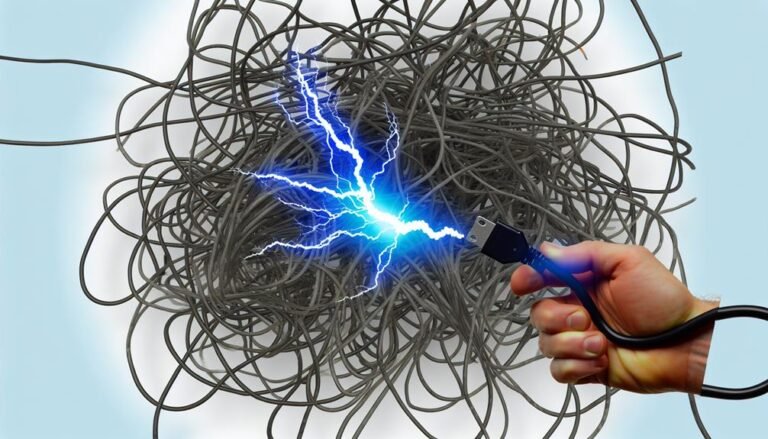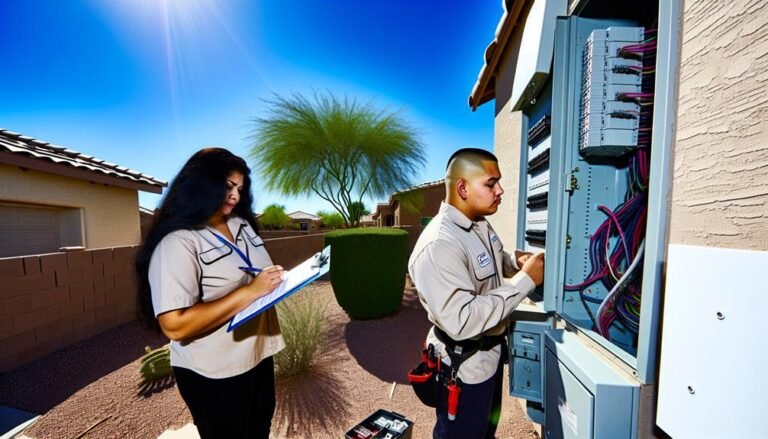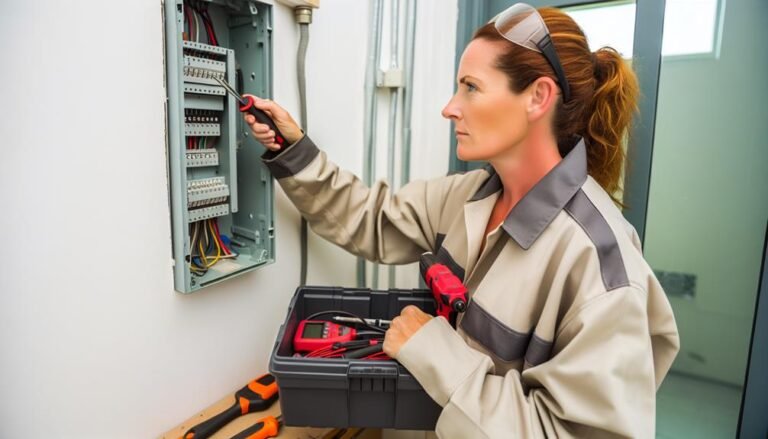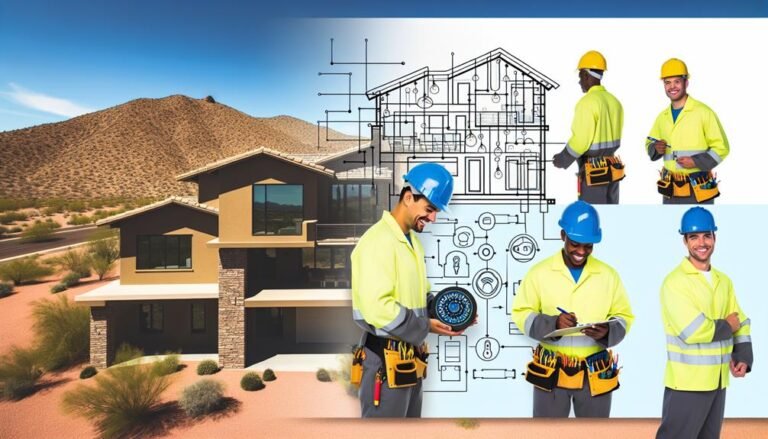Interviews With Leading Phoenix Electricians: Insights and Experiences
If you’ve ever wondered about the inner workings of the electrical industry in Phoenix, Arizona, look no further.
In this series of interviews with leading Phoenix electricians, you’ll gain valuable insights and experiences from those who have dedicated their careers to keeping the city powered.
From discussing the importance of proper electrical training to navigating complex systems and handling emergency situations with confidence, these experts will provide you with a behind-the-scenes look at their profession.
But that’s not all – there are also tips for ensuring electrical safety at home and a glimpse into the future of electrical technology in Phoenix.
So, get ready to uncover the secrets of the trade and discover what it takes to be a top electrician in the Valley of the Sun.
Key Takeaways
- Proper electrical training is crucial for ensuring safety and efficiency in the field.
- Familiarizing oneself with complex electrical systems through blueprints and diagrams is essential.
- Handling emergency situations requires prioritizing safety and seeking professional help.
- Ensuring electrical safety at home involves regular inspections, avoiding overloading circuits, and contacting professionals for water damage.
The Importance of Proper Electrical Training
Proper electrical training is crucial for ensuring safety and efficiency in the field of electrical work. Without the necessary training, individuals may lack the skills and knowledge needed to handle electrical systems properly, putting themselves and others at risk. Electrical work involves dealing with potentially hazardous equipment and high voltages, making it essential to have a thorough understanding of electrical principles, codes, and safety procedures.
By undergoing proper electrical training, you’ll learn how to safely install, repair, and maintain electrical systems. This training includes instruction on electrical theory, circuitry, wiring techniques, and equipment handling. It also covers safety protocols, such as using personal protective equipment, following proper lockout/tagout procedures, and identifying potential electrical hazards.
Having the proper training not only ensures your safety but also enhances your efficiency as an electrician. With the knowledge gained through training, you can work more effectively, troubleshoot problems efficiently, and complete projects in a timely manner. Additionally, proper training allows you to stay up-to-date with the latest electrical codes and regulations, ensuring compliance with industry standards.
Investing in your electrical training is an investment in your future as an electrician. It provides you with the skills and knowledge necessary to excel in your field while prioritizing safety and efficiency. Remember, proper training is the foundation of a successful and fulfilling career in electrical work.
Navigating Complex Electrical Systems
Navigating complex electrical systems requires a thorough understanding of circuitry and the ability to identify and troubleshoot potential issues. Here are four key factors to consider when working with complex electrical systems:
- Familiarize yourself with the system layout: Take the time to study the electrical system’s blueprints and diagrams. This will help you understand how the various components are interconnected and how power flows through the system.
- Use proper safety precautions: Working with complex electrical systems can be dangerous. Always wear appropriate personal protective equipment (PPE) such as gloves, goggles, and safety boots. Additionally, make sure to de-energize the system and lock out/tag out equipment before starting any work.
- Utilize diagnostic tools: Complex electrical systems often require the use of specialized diagnostic tools to identify and troubleshoot issues. These tools can include multimeters, circuit analyzers, and thermal imaging cameras. Familiarize yourself with these tools and how to interpret their readings.
- Stay updated on the latest technologies: Electrical systems are constantly evolving, and new technologies are introduced regularly. Stay informed about advancements in electrical systems, such as energy-efficient components and smart home automation, to better navigate and troubleshoot complex systems.
Handling Emergency Situations With Confidence
In emergency situations, it’s crucial to remain calm and take immediate action to ensure the safety of yourself and others. When faced with an electrical emergency, such as a power outage, electrical fire, or electric shock, there are several steps you can take to handle the situation confidently.
First, prioritize your safety. If there’s an immediate threat, such as a fire or someone in contact with live electricity, remove yourself and others from the area if it’s safe to do so. Call emergency services right away to report the incident and seek professional help.
Next, if it’s safe, try to identify the source of the problem. If it’s a power outage, check if the issue is isolated to your property or if it’s a widespread problem. If it’s an electrical fire, use a fire extinguisher if available or evacuate the premises and wait for help.
Do not attempt to fix the problem yourself unless you’re a qualified electrician. Tampering with electrical systems without proper training can lead to further damage or injury. Instead, contact a licensed electrician who can assess and resolve the emergency safely.
Tips for Ensuring Electrical Safety at Home
To ensure electrical safety at home, it’s important to follow proper maintenance and safety guidelines. Here are four tips to help you keep your home safe:
- Regularly inspect your electrical cords and outlets: Look for any signs of wear and tear, such as frayed cords or loose outlets. If you notice any issues, it’s important to address them promptly to avoid potential electrical hazards.
- Don’t overload your circuits: Overloading circuits can lead to overheating and electrical fires. Make sure you distribute your electrical load evenly across different outlets and circuits to prevent overloading.
- Use surge protectors: Surge protectors help to protect your electrical devices from power surges. They’re especially important for sensitive electronics, such as computers and televisions. Be sure to use surge protectors that are properly rated for your devices.
- Keep water away from electrical sources: Water and electricity don’t mix. Make sure to keep electrical appliances and outlets away from water sources, such as sinks, tubs, and wet floors. If you notice any water damage near electrical outlets or appliances, contact a professional electrician to assess the situation.
The Future of Electrical Technology in Phoenix
The future of electrical technology in Phoenix is rapidly advancing, with innovative developments paving the way for more efficient and sustainable power solutions. As the demand for electricity continues to grow, Phoenix is embracing new technologies to meet the needs of its residents.
One of the key advancements is the integration of smart grid systems, which allow for better monitoring and control of electricity distribution. With smart meters and sensors, homeowners can track their energy usage in real-time and make informed decisions to reduce consumption and lower their bills.
Another area of progress is the adoption of renewable energy sources. Solar power, in particular, is becoming increasingly popular in Phoenix due to its abundance of sunshine. More residential and commercial buildings are installing solar panels, not only to reduce their reliance on the grid but also to take advantage of federal and state incentives.
This shift towards clean energy isn’t only beneficial for the environment but also helps to create a more resilient and reliable electrical grid.
© 2026 By Electrician Phoenix Today






